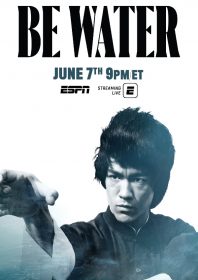
This melancholy, poignant Bruce Lee hagiography – made for the US sports channel ESPN – arrives at a time in Trump’s America when racial divisions are at boiling point. Carefully coordinated by the Lee estate – featuring involvement from his widow, Linda, and daughter Shannon, who reads select cuts from Lee’s diaries – this film tells the story of a young, determined and charismatic Asian American immigrant trying to make an impact in white 1960s America, battling structural racism, historic prejudice, and a media landscape which saw no need for diversification. It’s an absolute miracle that Lee would go on to have any legacy at all. Of course, sadly, these issues aren’t unique to Lee, and nearly 50 years after his death, Hollywood has only recently begun to right the wrongs of its past. Lee certainly never made claims to be an outwardly political or nationalistic figure, despite the film’s pains to place him at the epicentre of huge cultural shifts, like anti-colonial protests in Hong Kong, the Vietnam war and the civil rights movement. Lee’s philosophies preached about individualism, not collectivism, so the film has a slightly skewed revisionist feel to it. Also, being an authorised story, the more salacious, controversial side to his life is completely ignored; the drug-taking, the affairs, the ugly circumstances surrounding his death. As a documentarian, director Bao Nguyen takes a similar stylistic approach to the work of Asif Kapadia, relying entirely on archive material and off-camera narration to tell a nonlinear story which features a host of familiar names associated with Lee’s legacy who are still alive to tell their tales: Kareem Abdul-Jabbar, Dan Inosanto, Tony Liu, Nancy Kwan, Robert Lee, Andre Morgan, Angela Mao Ying, ex-girlfriend Amy Sanbo. The scratchy home footage is wonderful, and Bao does well to repurpose the limited Lee footage that ardent fans have seen a million times before. So, there’s nothing particularly new here, but the film isn’t trying to be an exposé. It’s a delicate, almost soporific introduction to a man who remains an important cross-cultural phenomenon, and a figurehead for the Asian American community who continue to fight for their voices to be heard.
- Country: United States
- Directed by: Bao Nguyen
- Starring: Andre Morgan, Bruce Lee, Dan Inosanto, Diana Lee Inosanto, Kareem Abdul-Jabbar, Linda Lee Cadwell, Nancy Kwan, Shannon Lee
- Produced by: Adam Neuhaus, Bao Nguyen, Gentry Kirby, Jenna Anthony, Julia Nottingham, Kristen Lappas, Marquis Daisy
- Studio: Dorothy Street Pictures












